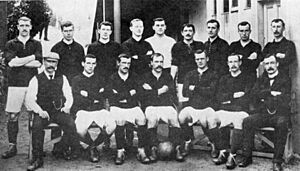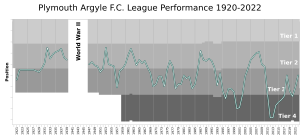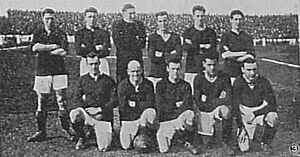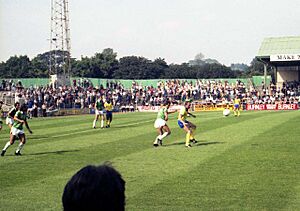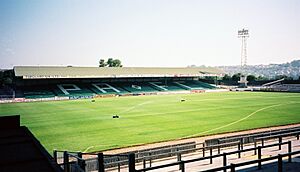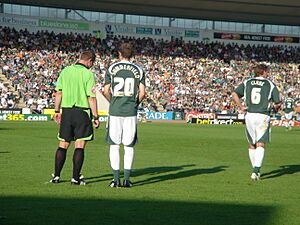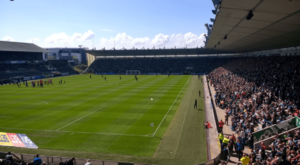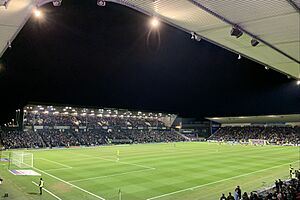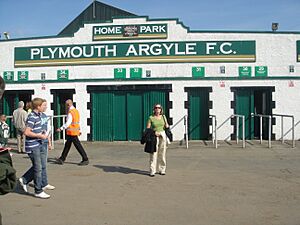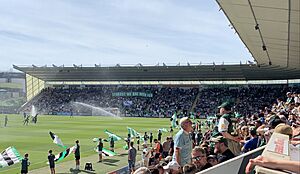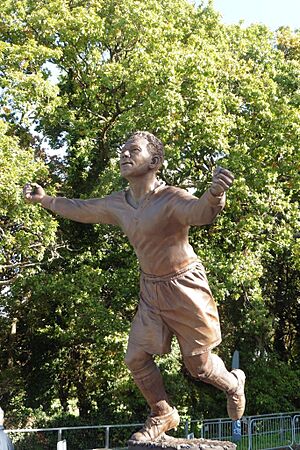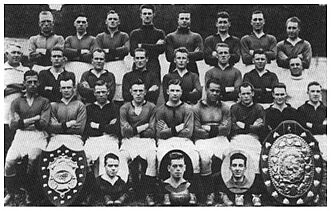Plymouth Argyle F.C. facts for kids
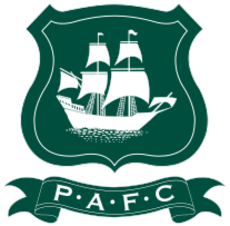 |
||||
| Full name | Plymouth Argyle Football Club | |||
|---|---|---|---|---|
| Nickname(s) | The Pilgrims; The Greens | |||
| Founded | 1886, as Argyle F.C. | |||
| Ground | Home Park | |||
| Capacity | 19,500 | |||
| Owner | Simon Hallett | |||
| Chairman | Simon Hallett | |||
| Head coach | Tom Cleverley | |||
| League | League Two | |||
| 2018–19 | League One, 21st of 24 (relegated) | |||
|
||||
Plymouth Argyle Football Club is a professional football team from Plymouth, Devon, England. They are known as The Pilgrims or The Greens. The team plays in EFL League One, which is the third level of English football. Their home stadium, Home Park, has been their base since 1901.
The club's nickname, The Pilgrims, comes from the Pilgrim Fathers. This was a group of English people who sailed from Plymouth to the New World in 1620. The club's badge even shows the Mayflower ship, which carried these pilgrims. Plymouth Argyle usually plays in green and white. They adopted a darker "Argyle green" in 2001 and have used it ever since. Plymouth is the largest city in England that has never had a top-level men's football team. Plymouth Argyle is also the most southerly and westerly professional football club in England.
The club started as Argyle in 1886. They became a professional team called Plymouth Argyle in 1903. They joined the Southern Football League and Western Football League that year. Argyle won the Western League in 1905 and the Southern League in 1913. In 1920, they joined the Football League Third Division. After finishing second many times, they finally won the Football League Third Division South in 1930. This earned them promotion to the Football League Second Division.
Argyle spent 20 years in the Second Division before being relegated in 1950. However, they quickly returned as Third Division South champions in 1952. After another relegation in 1956, they won the Third Division title again in 1959. The club was relegated from the Second Division in 1968, 1977, and 1992. They earned promotion from the Third Division as runners-up in 1975 and 1986.
In 1995, Argyle dropped to the fourth tier for the first time. They were promoted right away in 1996 but went down again in 1998. Under manager Paul Sturrock, they won the Third Division title in 2002 with 102 points. They won their fourth third-tier title in 2004 and stayed in the EFL Championship for six seasons. However, financial problems led to two relegations, and they ended up in EFL League Two by 2011.
Argyle earned promotion to EFL League One in 2017 and again in 2020. In the 2022–23 season, they won the League One title, returning to the Championship. This was their record fifth third-tier league title. In the 2024–25 season, Plymouth, despite being at the bottom of the league, defeated Premier League leaders Liverpool 1–0 in the FA Cup. They also beat Brentford in the third round.
Contents
Club History
Early Days and Professional Football (1886–1937)
The club started in 1886 as Argyle Football Club. Their first game was on October 16, 1886, which they lost 2–0. A few days later, they won their first match, beating Dunheved College 2–1. The club stopped playing in 1894 but restarted in 1897 as part of the Argyle Athletic Club. In 1898, Argyle F.C. created its first rulebook.
People wonder where the name Argyle came from. One idea is that it was named after an army group called the Argyll and Sutherland Highlanders. Another idea is that it came from a local pub, The Argyle Tavern, or a street called Argyle Terrace.
In 1903, the club became fully professional and changed its name to Plymouth Argyle. They joined the Southern League under manager Bob Jack. Argyle's first professional game was a 2–0 win against West Ham United on September 1, 1903. Their first home game as a professional club was on September 5, 1903, where they beat Northampton Town 2–0. Argyle won the Southern League in 1913. In 1920, they became a founding member of the Football League Third Division.
In 1924, a Plymouth Argyle team visited South America to play friendly matches. They surprisingly beat Uruguay 4–0, a team that would win the first World Cup six years later. They also beat Argentina 1–0 and drew 1–1 with Boca Juniors. Moses Russell was the captain and played in all nine games. People in Argentina were very impressed by his playing style.
During the match against Boca Juniors, fans invaded the pitch after Boca scored. After a delay, the game restarted, but another invasion happened when the referee gave a penalty against Boca. To avoid more trouble, the Argyle players agreed to miss the penalty. However, Moses Russell took it himself and scored, causing another pitch invasion and the game being stopped.
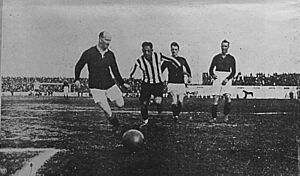
Back in England, Argyle finished second in the Football League Third Division South six times in a row between 1921 and 1927. They finally won promotion to Football League Division Two in 1930. Manager Bob Jack left in 1937 after 27 years. In 1928, David Jack, who started his career at Argyle, became the world's most expensive player when he joined Arsenal F.C. for £10,890. He was also the first player to score at Wembley Stadium.
Mid-Century Challenges (1937–1986)
After World War II, Argyle's 20-year stay in Division Two ended in 1950. But they quickly returned to Division Two in 1952 by winning the Third Division South. In 1953, they reached fourth place in the Second Division, their highest league finish ever. Floodlights were installed at Home Park in 1954. In 1956, Argyle was relegated again. They won Division Three in 1959, showing their pattern of moving between divisions.
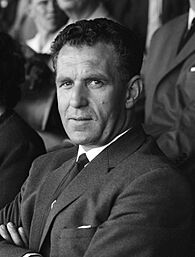
In 1963, Argyle went on a short tour to Poland. An amazing 100,000 people watched them play a game there, the biggest crowd ever for a Plymouth match. In 1965, Argyle reached the Football League Cup semi-final for the first time but lost to Leicester City. The decade ended with Argyle returning to Division Three in 1968.
In March 1973, 37,639 people watched Argyle play a friendly match against the famous Brazilian team Santos FC at Home Park. Santos had Pelé, one of the best footballers of all time. Argyle, a Third Division team, surprisingly won 3–2. They were 3–0 up, but Pelé scored a penalty for Santos. After the final whistle, fans rushed onto the pitch to celebrate Argyle's win.
In 1974, with future England player Paul Mariner on the team, Argyle reached the League Cup semi-final again. They drew 1–1 at home against Manchester City but lost the second game 2–0. After six years in Division Three, Argyle returned to Division Two in 1975. This was thanks to strikers Paul Mariner and Billy Rafferty, who scored 46 goals together. However, the club was relegated again in 1977. In 1978, Kevin Hodges started playing for Argyle. He went on to play 620 games for the club, more than any other player.
In 1984, Plymouth reached the FA Cup semi-final while still in the Third Division. They beat top-division team West Bromwich Albion and Derby County. However, they lost 1–0 to Watford in the semi-final. Manager John Hore was replaced by Dave Smith. In 1986, Argyle finished second in Division Three and were promoted. The next season, they finished 7th in Division Two, almost reaching the play-offs for the First Division. In 1988, Smith left, and Ken Brown became manager.
Modern Era and Championship Years (1986–2008)
In the 1990s, businessman Dan McCauley became chairman. He hired England's most capped player, Peter Shilton, as player-manager in 1991. But Shilton could not stop Argyle from being relegated in 1992. English football changed its league names that year. Argyle was still in Division Two, but it was now the third tier.
In 1993, Argyle finished in the middle of the third tier. The next season, they finished third and made it to the play-offs but lost to Burnley. In 1995, Shilton left, and Argyle was relegated to Division Three (the fourth tier) for the first time. Neil Warnock became the new manager.
At the end of the 1995–96 season, Warnock led Plymouth to play-off victory. They beat Colchester United in the semi-final and went to Wembley for the first time. Argyle beat Darlington 1–0 in the final to return to the third tier.
Warnock was sacked within a year, and Mick Jones took over. In 1997, Argyle won a memorable match at Chesterfield. The next season, Argyle was relegated under Jones. His replacement, Kevin Hodges, lasted three years but couldn't get the team promoted. At this point, Argyle faced serious financial problems.
The club's fortunes changed when Paul Sturrock became manager in November 2000. He saved the club from being relegated out of the Football League. In his second season, Argyle had their most successful year. They won the Division Three title with a club record of 102 points.
Argyle was expected to do well in the 2003–04 season, and they did. They earned their second promotion in three years. In March 2004, Bobby Williamson became manager. Argyle's first game in the new 'Championship' (second tier) was a 0–0 draw against Millwall. They even briefly reached the top of the table after a 1–0 win at Cardiff City. They finished 17th that season. In 2005–06, they finished 14th, safely away from relegation.
In 2006, manager Ian Holloway took charge. In one of his first games, Argyle played a friendly against Real Madrid in Austria. Holloway's first competitive game was a 1–1 draw against Wolves. The team did well in the FA Cup, reaching the quarter-finals. They beat Peterborough United and Derby County but lost to Watford. Argyle finished 11th in 2006–07, their highest league finish in 20 years.
Before the 2007–08 season, Ian Holloway said Plymouth could be promoted to the Premier League. They started well with a 3–2 win at Hull City. However, Holloway left in November 2007 to manage Leicester City.
Challenges and Recovery (2008–Present)
In 2008, the club finished 15th. On January 3, 2009, Argyle played Premier League team Arsenal in the FA Cup. Arsenal won 3–1. Argyle finished 21st in the league, just above the relegation places.
Paul Sturrock's second time as manager ended in December 2009 due to poor results. Argyle was at the bottom of the table and was relegated from the Championship after six years. In November 2010, they were 20th in League One.
In November 2010, Argyle beat Dagenham & Redbridge 2–1 at Home Park. However, only 4,960 fans attended, the lowest league attendance in a long time. Soon after, the club faced financial problems and was ordered to pay taxes. Relegation to League Two was confirmed in May 2011.
James Brent's Akkeron Group agreed to buy the club. Argyle sold Home Park back to Plymouth council for £1.6 million in October 2011. The team's performance improved after the takeover. They finished 21st for two seasons in a row, avoiding relegation. Manager John Sheridan then signed a three-year contract, and the club finished 10th in his first full season.
In 2017, Argyle had a chance to win the League Two title but lost it to Portsmouth on goal difference. They had a very bad start to their League One season, getting only 5 points from their first 11 games. However, from December 2017 through 2018, Argyle had a great run, winning 16 games and finishing 7th, just missing the play-off spots.
Hallett's Leadership (2018–Present)
In August 2018, Simon Hallett became the main owner of the club and took over as chairman in November 2018. At the end of the 2018–19 season, Argyle was relegated to League Two.
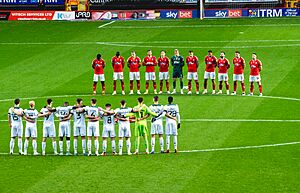
For the 2019–20 season, Hallett hired Ryan Lowe as manager. This change was a success, as Argyle finished third and were promoted back to League One. The next season, they finished 18th. In December 2021, Steven Schumacher took over as manager, leading the club to 7th place in the 2021–22 season.
Argyle had their best season since 2008 in 2022–23. The new Mayflower stand at Home Park was finished, increasing the stadium's capacity to 17,900. Over 16,000 fans regularly came to support the team. The club won the EFL League One title, finishing with 101 points. In their first season back in the second tier in 13 years, Plymouth finished 21st, avoiding relegation on the final day of the season.
Club Sponsorship
The club's sportswear is made by Puma. Their main sponsor is currently Classic Builders. Plymouth Argyle first had shirt sponsors in 1983. Beacon Electrical was the first, followed by Ivor Jones Insurance. National & Provincial sponsored them in 1986, and then the Sunday Independent for five seasons. Rotolok Holdings plc became the main sponsor in 1992. This lasted six seasons before the club partnered with the local newspaper, the Evening Herald. From 2002 to 2011, the club was sponsored by pasty-makers Ginsters.
In 2011, while the club was facing financial difficulties, local timber company WH Bond Timber sponsored Argyle's kits until 2014. Then, LTC Group87 sponsored them from 2014 to 2016. Ginsters returned as the main sponsor for a second time in the 2016–17 season.
| Period | Brand | Shirt Sponsor |
|---|---|---|
| 1975–1976 | Umbro | None |
| 1976–1978 | Pilgrim | |
| 1978–1980 | Bukta | |
| 1980–1982 | Adidas | |
| 1982–1983 | Pilgrim | |
| 1983–1984 | Beacon Electrical | |
| 1984–1986 | Ivor Jones Insurance | |
| 1986–1987 | National & Provincial | |
| 1987–1990 | Umbro | Sunday Independent |
| 1990–1992 | Ribero | |
| 1992–1996 | Admiral | Rotolok |
| 1996–1998 | Super League | |
| 1998–1999 | Errea | Evening Herald |
| 1999–2002 | Patrick | |
| 2002–2003 | Ginsters | |
| 2003–2005 | TFG | |
| 2005–2009 | Puma | |
| 2009–2011 | Adidas | |
| 2011–2014 | Puma | WH Bond Timber |
| 2014–2016 | LTC Powered Access | |
| 2016–2022 | Ginsters | |
| 2022–2023 | Project 35 | |
| 2023–2024 | WH Bond Timber | |
| 2024–2025 | Classic Builders(SW) | |
| 2025–Present | Beacon Electrical |
Home Stadium
The original Home Park stadium was destroyed during World War II bombings. After being rebuilt, it was largely renovated, with new stands opening in 2002. The stadium is located in Central Park, near the Peverell area. In 2006, the club bought the stadium from Plymouth City Council for £2.7 million.
In 2007, temporary seats were added to the Mayflower stand, making the capacity 19,888. In 2009, it was announced that Home Park might host matches for the 2018 World Cup if England won the bid. However, England did not win, and Plymouth Argyle faced financial difficulties in 2011. After selling the stadium back to the council for £1.6 million, plans for a new South Stand were uncertain.
Local business owner James Brent took over the club. He proposed plans for a new Mayflower Grandstand with 5,000 seats and a leisure complex. These plans included an ice rink, a cinema, a hotel, and shops. Planning permission was granted in 2013, but the plans were later withdrawn, though the permission remained.
The family section of the stadium was moved to the 'Zoo corner', with a kids' activity zone. In 2017, director Simon Hallett invested £5 million into the club for renovating the Mayflower Grandstand. Temporary seating was also put in place for an FA Cup match against Liverpool in 2017. In 2021, the Mayflower stand redevelopment was completed, making Home Park an all-seater stadium with a capacity of 17,900.
Fan Support
Plymouth Argyle fans are known as the Green Army. The No. 12 shirt is even reserved for them, representing the "12th man" on the team. Argyle fans are sometimes called "Janners," a local nickname for people from Plymouth.
The club had its highest average attendances in the 1940s, with a record average of 23,290 fans per game in the 1946–47 season. Attendances stayed strong until the 1980s, when they dropped significantly. This was a time when fan behavior issues affected football across England.
Today, most of the club's supporters come from Plymouth, Cornwall, and Devon. The "Devonport End" of the stadium is where the loudest fans gather. Since the 2021–22 season, "The Janner Song" is played before every home game.
A survey in 2003 showed that Plymouth Argyle supporters see Exeter City as their main rival. The two clubs first played each other in 1908. Other rivalries include Torquay United, Swindon Town, Portsmouth, Millwall, Bristol City, and Bristol Rovers.
Club Players
Current Squad
|
|
Players on Loan
|
Retired Numbers
- 12 – The Green Army (supporters)
Youth Team Players
Under–18 Team
|
|
¹apprenticeship extended after suffering a serious injury as a second-year
Player of the Year Awards
|
|
Young Player of the Year
|
|
|
|
Famous Former Players
Team of the Century
For the club's 100-year celebration, fans voted for the best Plymouth Argyle team of all time.
| 1 | GK | Jim Furnell | |
| 2 | DF | Gordon Nisbet | |
| 3 | DF | Jack Chisholm | |
| 4 | DF | Graham Coughlan | |
| 5 | DF | Colin Sullivan | |
| 6 | MF | Kevin Hodges | |
| 7 | MF | Johnny Williams | |
| 8 | MF | Garry Nelson | |
| 9 | FW | Tommy Tynan | |
| 10 | FW | Paul Mariner | |
| 11 | MF | Sammy Black |
Manager: ![]() Paul Sturrock
Paul Sturrock
Club Officials
Boardroom Team
| Position | Name |
|---|---|
| Chairman | |
| Director | |
| Director | |
| Director | |
| Director | |
| Director |
Club Ownership
In 2019, Simon Hallett owned 97% of the club. In August 2022, an American investment group called Argyle Green, LLC bought 20% of the club. This group included NHL players Ondřej Palát and Victor Hedman, and NBA Executive Jon Horst.
Senior Management Team
Football Management Team
| Position | Name |
|---|---|
| Head Coach | |
| Assistant Head Coach | |
| First-Team Coach | |
| First-Team Coach & Head of Player Development | |
| Goalkeeping Coach | |
| First-Team Performance Analyst | |
| Head of Recruitment | |
| Head of Physiotherapy | |
| Head of Sports Science | |
| First-Team Physiotherapist | |
| Lead Performance Analyst | |
| Head of Football Data | Vacant |
| Assistant Head of Football Data | |
| First-Team Analyst | |
| Assistant Club Secretary & Player Liaison Officer | |
| Club Doctor | |
| Scout |
Club Managers Through the Years
- 1903
 Frank Brettell
Frank Brettell - 1905
 Bob Jack
Bob Jack - 1906
 William Fullarton
William Fullarton - 1907
 Committee
Committee - 1910
 Bob Jack
Bob Jack - 1938
 Jack Tresadern
Jack Tresadern - 1947
 Jimmy Rae
Jimmy Rae - 1955
 Jack Rowley
Jack Rowley - 1960
 Neil Dougall
Neil Dougall - 1961
 Ellis Stuttard
Ellis Stuttard - 1963
 Andy Beattie
Andy Beattie - 1964
 Malcolm Allison
Malcolm Allison - 1965
 Derek Ufton
Derek Ufton - 1968
 Billy Bingham
Billy Bingham - 1970
 Ellis Stuttard
Ellis Stuttard - 1972
 Tony Waiters
Tony Waiters - 1977
 Mike Kelly
Mike Kelly - 1978
 Malcolm Allison
Malcolm Allison - 1979
 Bobby Saxton
Bobby Saxton - 1981
 Bobby Moncur
Bobby Moncur - 1983
 Johnny Hore
Johnny Hore - 1984
 Dave Smith
Dave Smith - 1988
 Ken Brown
Ken Brown - 1990
 David Kemp
David Kemp - 1992
 Peter Shilton
Peter Shilton - 1995
 Steve McCall
Steve McCall - 1995
 Neil Warnock
Neil Warnock - 1997
 Mick Jones
Mick Jones - 1998
 Kevin Hodges
Kevin Hodges - 2000
 Paul Sturrock
Paul Sturrock - 2004
 Bobby Williamson
Bobby Williamson - 2005
 Tony Pulis
Tony Pulis - 2006
 Ian Holloway
Ian Holloway - 2007
 Paul Sturrock
Paul Sturrock - 2009
 Paul Mariner
Paul Mariner - 2010
 Peter Reid
Peter Reid - 2011
 Carl Fletcher
Carl Fletcher - 2013
 John Sheridan
John Sheridan - 2015
 Derek Adams
Derek Adams - 2019
 Ryan Lowe
Ryan Lowe - 2021
 Steven Schumacher
Steven Schumacher - 2024
 Ian Foster
Ian Foster - 2024
 Wayne Rooney
Wayne Rooney - 2025
 Miron Muslic
Miron Muslic - 2025
 Tom Cleverley
Tom Cleverley
Club Records and Statistics
Team Records
- Best FA Cup result: Semi-final, 1983–84
- Best League Cup result: Semi-final, 1964–65, 1973–74
- Best EFL Trophy result: Runners-up: 2022–23
- Record attendance at Home Park: 43,596 vs. Aston Villa, Second Division, October 10, 1936
- Longest unbeaten run: 25 games, April to December 1929
- Biggest wins:
- 8-1 vs Millwall, Second Division, January 16, 1932, Home Park
- 8-1 vs Hartlepool United, Second Division, May 7, 1994, Victoria Park
- 7-0 vs Chesterfield, Second Division, January 3, 2004, Home Park
- Biggest League defeat: 0–9 vs. Stoke City, Second Division, December 17, 1960
- Most League points (2 for a win): 68, Third Division South, 1929–30
- Most League points (3 for a win): 102, Third Division, 2001–02
- Most League goals in a season: 107, Third Division South, 1925–26 and 1951–52
- Most goals by a player in a season: 33, Jack Cock, Third Division South, 1926–27
- Fastest five goals:
- Argyle scored five goals in just 17 minutes against Chesterfield on January 3, 2004. This set an English record for the fastest five goals in a professional game.
Most Appearances
Most Goals Scored
| Rank | Player | Career | Goals | Apps |
|---|---|---|---|---|
| 1 | 1924–1938 | 184 | 491 | |
| 2 | 1957–1964 | 148 | 275 | |
| 3 | 1983–1985 1986–1990 |
145 | 310 | |
| 4 | 1921–1934 | 136 | 401 | |
| 5 | 1947–1955 | 112 | 253 | |
| 6 | 1929–1939 | 103 | 256 | |
| 7 | 1906–1915 | 92 | 239 | |
| 8 | 1978–1992 | 87 | 620 | |
| 9 | 1927–1933 | 85 | 153 | |
| 10 | 1990–1997 2001–2006 |
81 | 432 |
Club Honours
League Titles
- Third Division South / Third Division / Second Division / League One (Level 3)
- Champions: 1929–30, 1951–52, 1958–59, 2003–04, 2022–23
- Runners-up: 1921–22, 1922–23, 1923–24, 1924–25, 1925–26, 1926–27, 1974–75, 1985–86
- Third Division / League Two (Level 4)
- Champions: 2001–02
- Runners-up: 2016–17
- Promoted: 2019–20
- Play-off winners: 1996
- Southern League
- Champions: 1912–13
- Western League
- Champions: 1904–05
Cup Competitions
- EFL Trophy
- Runners-up: 2022–23
See also
 In Spanish: Plymouth Argyle Football Club para niños
In Spanish: Plymouth Argyle Football Club para niños
 | Precious Adams |
 | Lauren Anderson |
 | Janet Collins |


